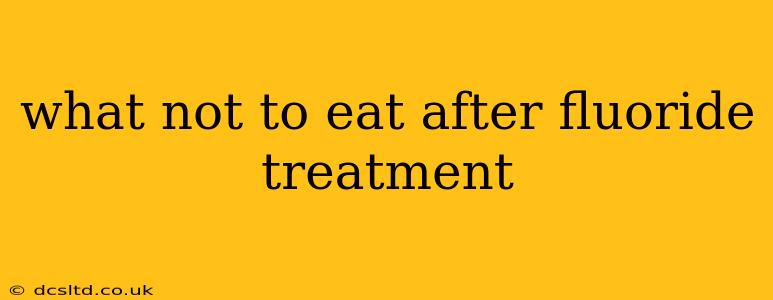What Not to Eat After a Fluoride Treatment: A Comprehensive Guide
Fluoride treatments, whether professional applications at the dentist's office or at-home treatments, aim to strengthen tooth enamel and prevent cavities. However, certain foods and drinks can interfere with the treatment's effectiveness, potentially diminishing its benefits. This guide outlines what to avoid after a fluoride treatment to maximize its impact.
What are the common types of fluoride treatments?
Before we delve into dietary restrictions, it's important to understand that fluoride treatments vary. Professional treatments in a dental office usually involve a stronger fluoride gel or foam applied directly to the teeth. At-home treatments often consist of fluoride mouthwashes or toothpastes. The specific recommendations regarding food and drink will depend on the type and strength of the fluoride treatment administered.
Why should I avoid certain foods and drinks after a fluoride treatment?
The primary reason to restrict certain food and drink consumption after a fluoride treatment is to allow sufficient time for the fluoride to fully penetrate and strengthen the enamel. Consuming acidic or sugary items immediately afterward can neutralize the fluoride's effect and potentially wash it away before it's had a chance to work its magic.
What foods and drinks should I avoid after a fluoride treatment?
The following foods and drinks are generally recommended to avoid for at least 30 minutes to an hour after a fluoride treatment:
-
Highly Acidic Foods and Drinks: These include citrus fruits (oranges, lemons, grapefruits), tomatoes, sodas, and even some fruit juices. Acids can erode tooth enamel and interfere with fluoride's absorption.
-
Sugary Foods and Drinks: Sugary treats like candy, pastries, cookies, and sugary drinks provide fuel for bacteria in the mouth, increasing the risk of cavities, even after a fluoride treatment.
-
Caffeinated Beverages: While not inherently acidic or sugary, caffeine can be dehydrating. Dehydration can reduce saliva production, impacting the fluoride's ability to effectively coat the teeth.
-
Colored Drinks: Highly pigmented drinks like coffee, tea, and red wine can temporarily stain teeth, potentially masking the benefits of the fluoride treatment. This is especially relevant after professional treatments where the teeth may be more sensitive.
How long should I wait after a fluoride treatment before eating or drinking?
Your dentist will give specific instructions based on the type of treatment you received. However, a general guideline is to wait at least 30 minutes to an hour before consuming anything other than plain water.
What can I eat and drink after a fluoride treatment?
After the recommended waiting period, it's best to stick to bland, neutral foods and drinks. Plain water is ideal. You can gradually reintroduce other foods and drinks into your diet, but it's advisable to continue avoiding excessively acidic, sugary, and caffeinated items for the remainder of the day.
What if I accidentally eat or drink something I shouldn't have?
Don't panic! While it might slightly reduce the effectiveness of the treatment, it won't completely negate it. Maintain good oral hygiene practices, including brushing and flossing regularly, to maximize the benefits of the fluoride treatment.
Can I brush my teeth after a fluoride treatment?
This depends entirely on your dentist’s instructions. Some dentists may recommend waiting for a specific period before brushing, while others may advise brushing gently after a certain amount of time. Always follow your dentist's specific instructions.
Remember, this information is for general guidance only. Always consult your dentist for personalized advice and instructions regarding fluoride treatments and post-treatment care. They can provide tailored recommendations based on your individual needs and the type of fluoride treatment you received. Maintaining a healthy diet and good oral hygiene practices remain crucial for optimal oral health, regardless of fluoride treatments.
